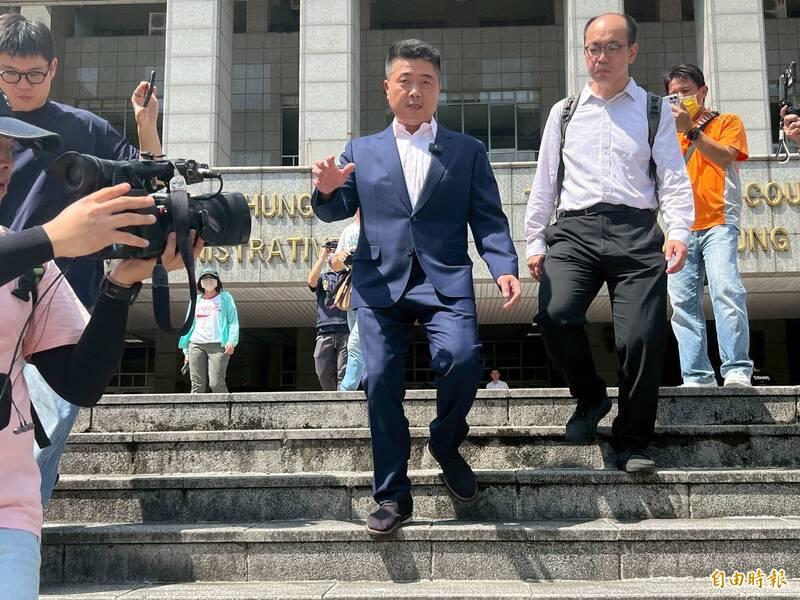The Taichung branch of the High Court today upheld a combined sentence of eight years and four months imposed on Chinese Nationalist Party (KMT) Legislator Yen Kuan-heng (顏寬恒) by the Taichung District Court after being found guilty of corruption and forgery, rejecting his appeal.
The Taichung branch of the High Court today said that the corruption conviction can be appealed.
If the ruling is finalized, Yen would no longer be qualified for his office, as he has been deprived of his civil rights over the corruption charges.

Photo: Liao Yao-tung, Taipei Times
In response to the ruling, Yen said that it was obviously judicial persecution and unacceptable.
This is an era when politics overrides the judiciary, and judicial persecution is used as a tool to remove rivals, he said outside the court.
Prosecutors launched a large-scale investigation within a week after he announced that he would run in the 2023 legislative election, he said.
He denied wrongdoing, vowing to clear his name and prove his innocence in the upcoming legal procedures.
Yen was sentenced to seven years and ten months for contravening Article 5 of the Anti-Corruption Act (貪污治罪條例) by making unlawful profits or withholding public funds through the guise of paying a legislative office assistant, the Taichung District Court ruled in July last year.
For the corruption charges, the court ordered the confiscation of NT$1.08 million (US$32,896) from Yen as illegal profits from pocketing the wages of an office assistant.
The court deprived Yen of his civil rights for three years.
The court also convicted Yen on forgery charges and sentenced him to six months, based on a transaction regarding his family mansion in Taichung’s Shalu District (沙鹿).
The building had stirred controversy earlier, as it was partially on state-owned land and an environmental protection area.
Yen was found not guilty of illegal acquisition of state-owned land.

The Chinese military has built landing bridge ships designed to expand its amphibious options for a potential assault on Taiwan, but their combat effectiveness is limited due to their high vulnerability, a defense expert said in an analysis published on Monday. Shen Ming-shih (沈明室), a research fellow at the Institute for National Defense and Security Research, said that the deployment of such vessels as part of the Chinese People’s Liberation Army (PLA) Navy’s East Sea Fleet signals a strong focus on Taiwan. However, the ships are highly vulnerable to precision strikes, which means they could be destroyed before they achieve their intended

The Taiwan Experience Education Program (TEEP) has funded short-term internships in Taiwan for more than 4,500 young people from more than 40 countries since 2015, with the goal of attracting and retaining international talent, the Ministry of Education said yesterday. Fifty-five colleges launched 514 projects this year, including in fields such as semiconductors, artificial intelligence, medicine and biotechnology, green energy, and sustainability, it said. The program provides research and practical internships in Taiwan for two to six months, and offers cultural exchange and networking opportunities, the ministry said. For example, National Formosa University’s Embedded System and Autopilot Laboratory developed two solar-powered drones in

GLOBAL: Although Matsu has limited capacity for large numbers of domestic tourists, it would be a great high-end destination for international travelers, an official said Lienchiang County’s (Matsu) unique landscape and Cold War history give it great potential to be marketed as a destination for international travelers, Tourism Administration Director General Chen Yu-hsiu (陳玉秀) said at the weekend. Tourism officials traveled to the outlying island for the Matsu Biennial, an art festival that started on Friday to celebrate Matsu’s culture, history and landscape. Travelers to Matsu, which lies about 190km northwest of Taipei, must fly or take the state-run New Taima passenger ship. However, flights are often canceled during fog season from April to June. Chen spoke about her vision to promote Matsu as a tourist attraction in

Taipei resident Mu Chu-hua caught some glimpses of China’s mighty military parade on YouTube on Wednesday. As she watched hypersonic missiles roll down Beijing’s Changan Avenue and troops march in lockstep, she did not feel like they posed a threat to Taiwan. Mu, a 69-year-old retiree, said she saw the parade as simply a way for Chinese President Xi Jinping (習近平) to “say thank you to the troops.” “I thought it was quite normal,” she said. “It was very cool.” China’s military parade commemorating the end of World War II was being watched internationally for insights into Beijing’s military advances and its show